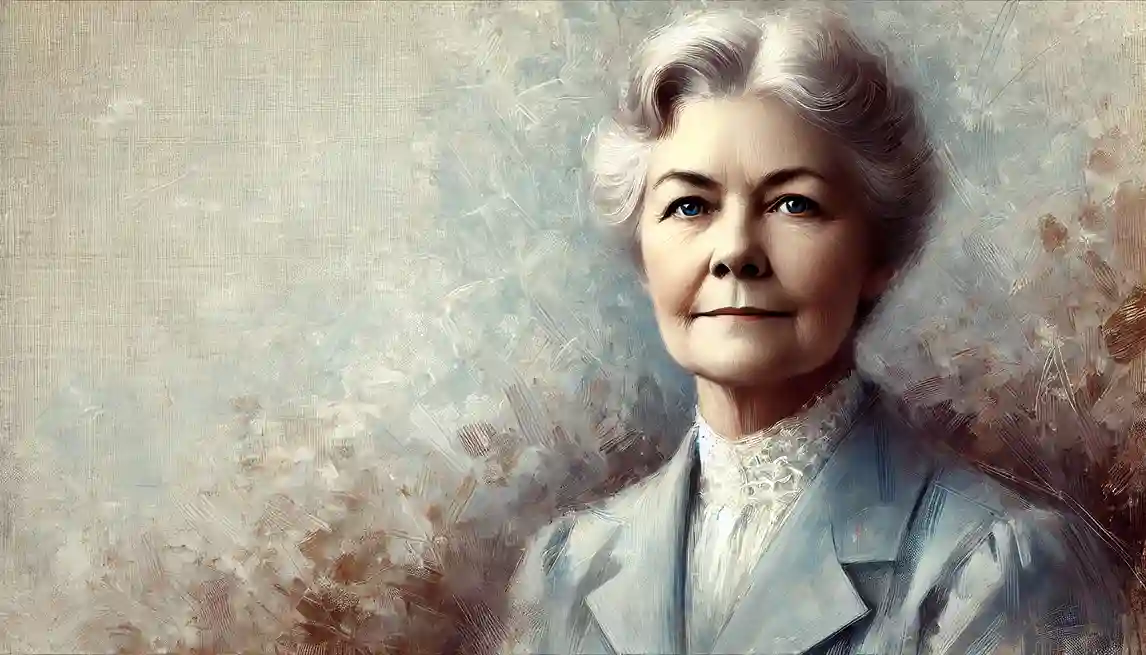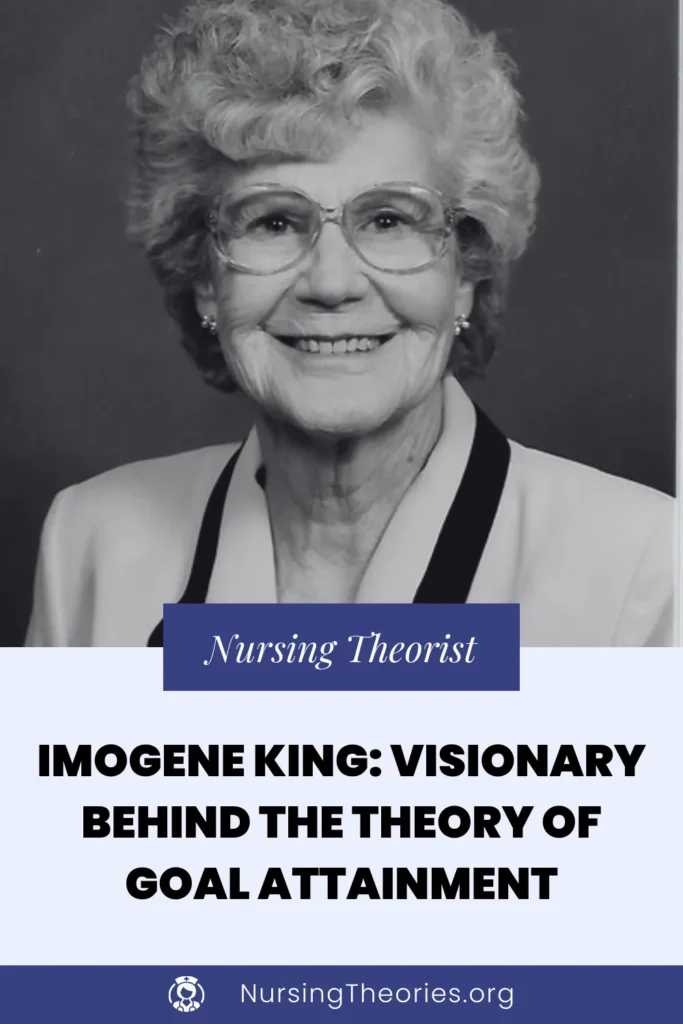Imogene King, a trailblazing nurse theorist and educator, is celebrated for developing the Theory of Goal Attainment, a framework that highlights the importance of collaboration between nurses and patients to achieve health-related goals.
Her theory emphasizes mutual goal-setting and communication as vital elements in the healing process.
King’s contributions have profoundly shaped modern nursing practice, particularly in patient-centered care and nursing management.
In this article, we cover Imogene King’s life, achievements, philosophy, and lasting impact on modern nursing.

Quick Summary
- Developed the Theory of Goal Attainment, emphasizing collaborative goal-setting and communication.
- Advocated for the active involvement of patients in their care to promote positive outcomes.
- Authored influential works that shaped nursing practice, education, and research.
- Created a conceptual framework linking individual, group, and societal systems in healthcare.
- Recognized globally for her contributions to nursing theory and patient-centered care.
Early Life and Background of Imogene King

Birth and Family Background of Imogene King
- Imogene Eva Martina King was born on January 30, 1923, in West Point, Iowa, King grew up in a supportive family that encouraged education and service.
- Her early exposure to community service and caregiving fostered her interest in healthcare and nursing.
Education and Early Influences in King’s Life
- King earned her nursing diploma from St. John’s Hospital School of Nursing in St. Louis, Missouri.
- She pursued advanced studies, earning a bachelor’s degree in nursing education, a master’s degree in nursing, and a doctorate in education.
- Her academic journey and clinical experiences inspired her to develop a comprehensive nursing theory that bridges theory and practice.
Imogene King’s Philosophy and Vision for Nursing
- King believed that effective nursing involves a dynamic interaction between nurses and patients, where mutual goal-setting and collaboration are key to success.
- Her vision emphasized that nurses should empower patients by involving them in decision-making and goal-setting.
- Famous quote: “Nursing is a process of human interaction where the nurse and client communicate to establish goals, and work together to achieve them.”
Imogene King’s Education and Early Nursing Career
Formal Education and Nursing Training of Imogene King
- After completing her nursing diploma, King pursued higher education, earning a master’s degree in nursing from St. Louis University and a doctorate in education from Teachers College, Columbia University.
- Her interdisciplinary studies in education, psychology, and nursing laid the foundation for her conceptual framework.
Early Professional Experiences in King’s Career
- King worked as a clinical nurse, nurse educator, and administrator, gaining firsthand experience in patient care, teaching, and leadership.
- Her experiences in diverse healthcare settings revealed the need for a theory that addresses the complexities of nurse-patient interactions.
Key Achievements and Contributions of Imogene King
Development of the Theory of Goal Attainment
- King’s Theory of Goal Attainment focuses on the interaction between nurses and patients, where both parties collaborate to set and achieve health-related goals.
- The theory is grounded in the idea that effective communication and goal-setting are essential for positive outcomes. Key elements of the theory include:
- Perception: How nurses and patients perceive each other and their roles.
- Communication: The exchange of information to identify and set mutual goals.
- Interaction: Collaborative efforts to achieve the agreed-upon goals.
- King’s theory is widely applied in clinical settings, where it guides nurses in creating patient-centered care plans.
Development of King’s Conceptual Framework
- King created a conceptual framework that connects three interacting systems:
- Personal System: The individual patient and their needs.
- Interpersonal System: The relationship between the nurse and the patient.
- Social System: The broader healthcare environment and community context.
- The framework provides a holistic approach to patient care by addressing individual, group, and societal factors.
Contributions to Nursing Education and Curriculum Development
- King integrated her theory and conceptual framework into nursing curricula, teaching students the importance of patient engagement and communication.
- Her work in nursing education emphasized the connection between theory, research, and practice.
Research and Theoretical Advancements
- King conducted research on the role of goal-setting and communication in patient outcomes, demonstrating that collaborative care improves health results.
- Her studies provided empirical support for her theory, making it a foundational model in nursing practice.
Global Impact and Recognition
- King’s theory has been adopted in nursing education and practice worldwide, influencing how nurses approach patient care and goal-setting.
- She received numerous awards, including honorary doctorates and recognition for her contributions to nursing theory.
Overview of Imogene King’s Theory of Goal Attainment
- The theory focuses on establishing mutual goals between nurses and patients to improve health outcomes.
- Through effective communication, nurses help patients set realistic goals and collaborate on achieving them.
- To explore this theory in greater depth, visit the in-depth article on the Theory of Goal Attainment.
Notable Publications by Imogene King
- Toward a Theory for Nursing: General Concepts of Human Behavior – A book that outlines her conceptual framework and theory of goal attainment.
- A Theory for Nursing: Systems, Concepts, Process – A foundational work that further explores her theory and its applications.
- Numerous research articles on goal-setting, patient-centered care, and nursing systems.
Challenges and Criticisms of Imogene King’s Work
Challenges in Applying the Theory in Complex Settings
- Some nurses have found it challenging to apply King’s theory in fast-paced or resource-limited environments.
- King emphasized that her theory is flexible and can be adapted to different healthcare settings.
Criticisms of the Theory’s Emphasis on Collaboration
- Critics argue that not all patients are willing or able to actively participate in goal-setting.
- Proponents of the theory highlight that even minimal patient involvement can improve outcomes when facilitated by skilled nurses.
Timeline of Major Milestones in Imogene King’s Life
- 1923: Born in West Point, Iowa.
- 1945: Earned her nursing diploma.
- 1960s: Developed the Theory of Goal Attainment.
- 1971: Published Toward a Theory for Nursing: General Concepts of Human Behavior.
- 1980s: Integrated her theory into nursing curricula and clinical practice globally.
- 2007: Passed away, leaving a lasting legacy in nursing theory and practice.
Legacy and Lasting Impact of Imogene King
Impact on Nursing Practice and Patient Care
- King’s theory has enhanced patient-centered care by promoting active patient participation and mutual goal-setting.
Global Influence and Recognitions
- Her work is taught in nursing schools worldwide and applied in various healthcare settings.
- King’s contributions have earned her numerous honors, including lifetime achievement awards.
Final Years and Passing of Imogene King
- King continued to mentor students and contribute to nursing research until her passing in 2007.
- Her legacy lives on through the widespread application of her theory in patient care and nursing education.
Key Lessons from Imogene King for Modern Nursing
- Mutual goal-setting: Collaborating with patients to set and achieve goals improves outcomes.
- Effective communication: Clear communication between nurses and patients fosters trust and understanding.
- Holistic approach: Addressing personal, interpersonal, and societal factors enhances patient care.
- Patient empowerment: Involving patients in their care plans leads to greater satisfaction and adherence.
- Continuous learning: King’s dedication to research highlights the importance of integrating theory into practice.
Conclusion
Imogene King’s Theory of Goal Attainment revolutionized nursing by emphasizing collaboration and mutual goal-setting between nurses and patients.
Her work, explored further in the in-depth article on the Theory of Goal Attainment, remains a cornerstone of patient-centered care and nursing education.
King’s legacy endures as her contributions continue to guide nurses in delivering effective, holistic care.


